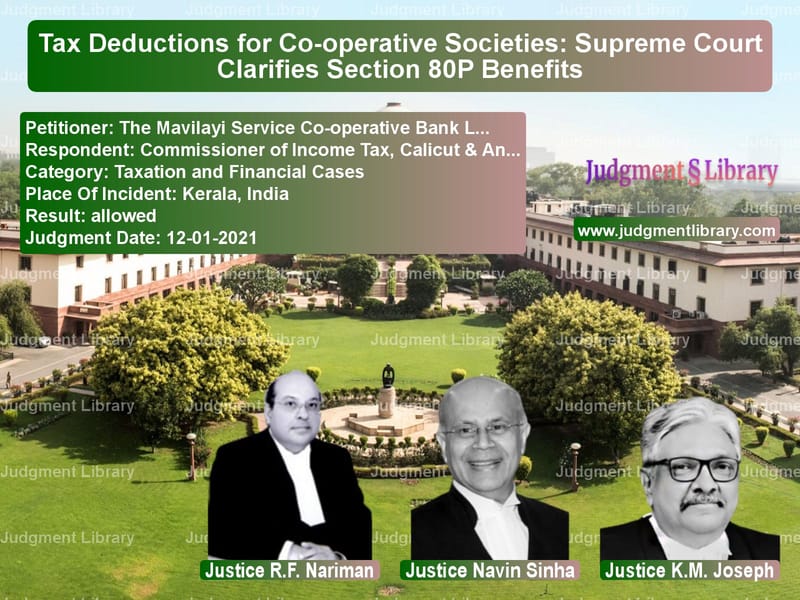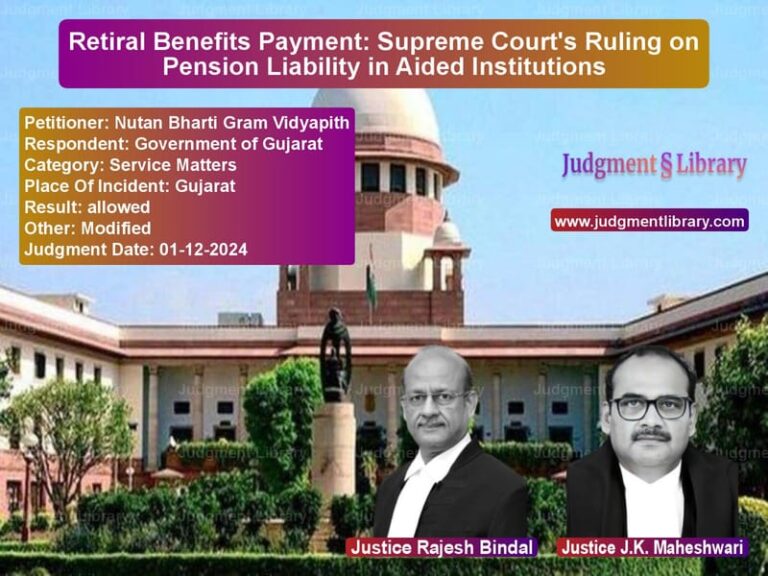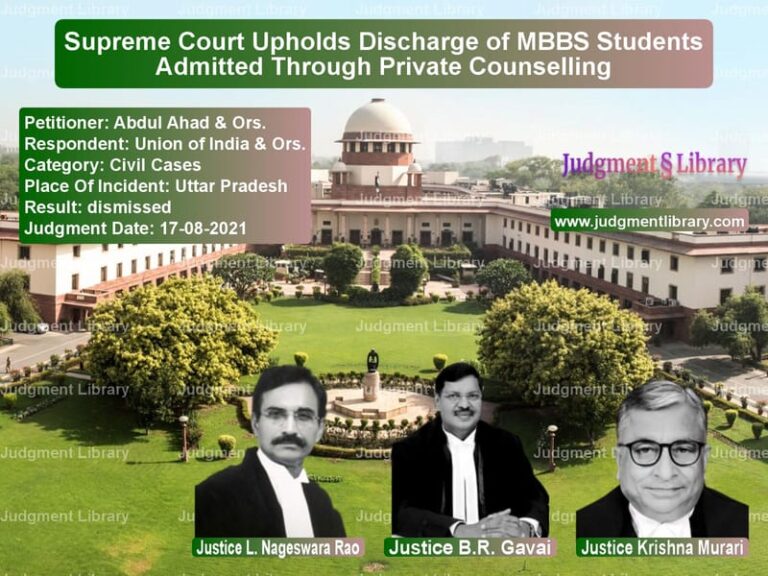Tax Deductions for Co-operative Societies: Supreme Court Clarifies Section 80P Benefits
The Supreme Court of India, in The Mavilayi Service Co-operative Bank Ltd. & Ors. vs. Commissioner of Income Tax, Calicut & Anr., delivered a landmark ruling on the eligibility of co-operative societies to claim tax deductions under Section 80P of the Income-Tax Act, 1961. The case addressed whether tax authorities could deny deductions to co-operative societies by reinterpreting their activities beyond state registrations.
The judgment clarified that co-operative societies that are not co-operative banks under the Banking Regulation Act, 1949 remain eligible for deductions under Section 80P(2)(a)(i). The ruling sets a precedent for taxation policies applicable to co-operative institutions and protects their tax-exempt status from arbitrary exclusions.
Background of the Case
The appellants, comprising multiple co-operative societies from Kerala, had claimed tax deductions under Section 80P(2)(a)(i), which allows deductions for income earned by co-operative societies engaged in providing credit facilities to their members. However, following the introduction of Section 80P(4) in 2006, tax authorities began rejecting their claims, arguing that many of these societies were functioning as commercial banks rather than agricultural credit providers.
Read also: https://judgmentlibrary.com/gst-levy-on-lottery-and-taxable-goods-constitutional-validity-upheld/
The Kerala High Court upheld the tax department’s interpretation, ruling that tax officers could assess whether co-operative societies were engaged in genuine agricultural credit activities. This decision led to widespread litigation and uncertainty among co-operatives, culminating in an appeal before the Supreme Court.
Legal Issues Addressed
1. Whether Co-operative Societies Were Eligible for Section 80P Deductions
The petitioners contended that they were primary agricultural credit societies under state laws and thus eligible for deductions. The tax authorities, however, claimed that many of these societies engaged in lending beyond agricultural activities, making them ineligible under Section 80P(4).
2. Whether Section 80P(4) Affected Existing Deductions
Section 80P(4), introduced by the Finance Act, 2006, specifically excluded co-operative banks from claiming deductions under Section 80P. The tax department argued that this exclusion extended to any co-operative society engaging in banking-like activities, even if not registered as a co-operative bank.
3. Whether Tax Officers Had the Authority to Re-examine State Registrations
The Kerala High Court’s decision permitted tax officers to investigate whether a society’s activities aligned with its registration status. The appellants challenged this, asserting that state law classifications should be final and binding for tax purposes.
Arguments by the Petitioner (Co-operative Societies)
- Legislative Intent: Section 80P was enacted to encourage the co-operative movement, and its benefits should not be withdrawn arbitrarily.
- State Recognition: Societies registered as primary agricultural credit societies under state law should automatically qualify for tax deductions.
- Nature of Lending: While some societies provided loans for non-agricultural purposes, their primary function remained agricultural credit, keeping them within Section 80P(2)(a)(i).
- Unjustified Taxation: The tax department’s approach treated co-operatives like commercial banks, imposing an undue burden contrary to legislative intent.
Arguments by the Respondent (Income Tax Department)
- Scope of Section 80P(4): The tax department argued that the provision was meant to exclude any entity conducting banking-like activities, regardless of registration.
- Fraudulent Claims: Some societies were allegedly functioning as commercial lenders, granting loans unrelated to agriculture.
- Investigative Authority: The department maintained that tax officers had the right to scrutinize societies’ actual activities rather than relying solely on their registered classification.
Supreme Court’s Analysis and Ruling
1. Section 80P Deductions Apply to Co-operatives Engaged in Credit Activities
The Supreme Court ruled that co-operative societies not classified as co-operative banks under the Banking Regulation Act, 1949, remain eligible for Section 80P(2)(a)(i) deductions. It observed:
“The provision aims to benefit co-operative societies engaged in providing credit facilities to their members. The mere fact that they lend for non-agricultural purposes does not disqualify them.”
2. Section 80P(4) Applies Exclusively to Co-operative Banks
The Court clarified that the exclusion under Section 80P(4) was intended only for co-operative banks and did not extend to primary agricultural credit societies. The ruling stated:
“The legislative intent behind Section 80P(4) was to prevent misuse of deductions by co-operative banks, not to deprive genuine credit societies of tax benefits.”
3. Tax Authorities Cannot Override State Law Classifications
The Supreme Court held that once a society is registered as a primary agricultural credit society under state law, tax authorities cannot reclassify it based on its lending activities. The judgment observed:
“State authorities have exclusive jurisdiction to determine a co-operative society’s status. The tax department cannot ignore these classifications and conduct independent assessments.”
4. Protection for Genuine Co-operatives
The Court ruled that tax authorities must provide clear evidence before denying deductions under Section 80P. It emphasized:
“Deductions cannot be disallowed based on presumptions. The burden lies on the tax department to establish that a society is engaged in impermissible banking activities.”
Supreme Court’s Verdict
- The Kerala High Court’s ruling allowing tax officers to reassess co-operative societies was set aside.
- Co-operative societies not classified as co-operative banks under the Banking Regulation Act remain eligible for deductions.
- Tax authorities cannot independently determine whether a society qualifies for Section 80P benefits.
- The ruling applies prospectively, ensuring relief for eligible co-operatives.
Conclusion
This judgment has far-reaching implications for co-operative societies across India, reaffirming their tax-exempt status under Section 80P. The ruling establishes that:
- Co-operative societies engaged in credit facilities remain eligible for tax deductions.
- Section 80P(4) applies only to co-operative banks and not primary agricultural credit societies.
- Tax authorities cannot override state law classifications while assessing deductions.
- Genuine co-operative societies must be protected from arbitrary tax reclassification.
The Supreme Court’s ruling strengthens the co-operative sector, ensuring they continue to receive tax benefits intended to support their operations and growth.
Petitioner Name: The Mavilayi Service Co-operative Bank Ltd. & Ors..Respondent Name: Commissioner of Income Tax, Calicut & Anr..Judgment By: Justice R.F. Nariman, Justice Navin Sinha, Justice K.M. Joseph.Place Of Incident: Kerala, India.Judgment Date: 12-01-2021.
Don’t miss out on the full details! Download the complete judgment in PDF format below and gain valuable insights instantly!
Download Judgment: the-mavilayi-service-vs-commissioner-of-inco-supreme-court-of-india-judgment-dated-12-01-2021.pdf
Directly Download Judgment: Directly download this Judgment
See all petitions in Income Tax Disputes
See all petitions in Banking Regulations
See all petitions in Tax Evasion Cases
See all petitions in Tax Refund Disputes
See all petitions in Judgment by Rohinton Fali Nariman
See all petitions in Judgment by Navin Sinha
See all petitions in Judgment by K.M. Joseph
See all petitions in allowed
See all petitions in supreme court of India judgments January 2021
See all petitions in 2021 judgments
See all posts in Taxation and Financial Cases Category
See all allowed petitions in Taxation and Financial Cases Category
See all Dismissed petitions in Taxation and Financial Cases Category
See all partially allowed petitions in Taxation and Financial Cases Category







